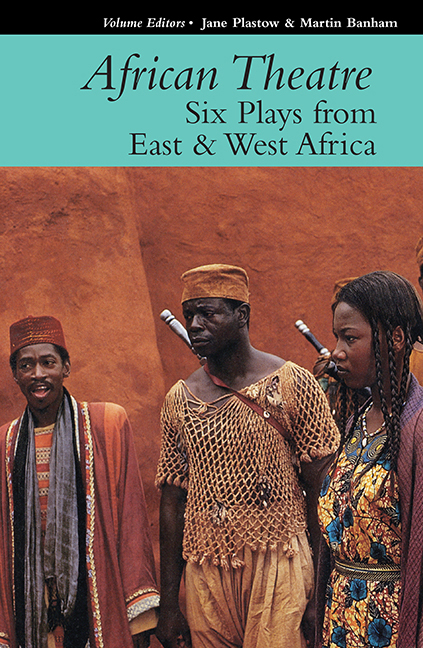Book contents
- Frontmatter
- Contents
- Notes on Contributors
- Obituary: Adieu Alain Ricard
- Preface
- THREE PLAYS FROM EAST AFRICA
- THREE PLAYS FROM WEST AFRICA
- Book Reviews
- Robert Mshengu Kavanagh, A Contended Space – The Theatre of Gibson Mtutuzeli Kente
- Edward Wilson-Lee, Adventures with the Ever-Living Poet: Shakespeare in Swahililand
- Francis Nii-Yartey, African Dance in Ghana: Contemporary Transformations
Olu Obafemi, Dark Times Are Over? and Running Dreams
from Book Reviews
Published online by Cambridge University Press: 24 August 2019
- Frontmatter
- Contents
- Notes on Contributors
- Obituary: Adieu Alain Ricard
- Preface
- THREE PLAYS FROM EAST AFRICA
- THREE PLAYS FROM WEST AFRICA
- Book Reviews
- Robert Mshengu Kavanagh, A Contended Space – The Theatre of Gibson Mtutuzeli Kente
- Edward Wilson-Lee, Adventures with the Ever-Living Poet: Shakespeare in Swahililand
- Francis Nii-Yartey, African Dance in Ghana: Contemporary Transformations
Summary
The emerging restive youth culture in Nigeria has been a critical subject in Nigerian writing recently, with Obafemi's Dark Times Are Over? one of the pioneering plays. The play opens with a series of activities by university student associations, ranging from ‘Kegite’ (palm-wine club), to ‘Yepa’ (a religious cult group) and ‘Aristo Girls’ (campus ‘sex workers'). The groups, under the guise of freedom of association, constitute themselves into different forms of lethal nuisance on campus and, in the fight for supremacy, violence ensues. The emergence of ‘Man O’ War’ – a voluntary informal para-military group – provides hope for the restitution of the campus from the stranglehold of terror. The return of the campus to a conducive environment for learning is, however, short-lived. Obafemi berates the decay in the education and legal systems, two arms of national development. The young generation constitute the main focus of the play, which laments their vulnerability to the vices pervading tertiary institutions in Nigeria. Instead of being the fulcrum of the development of young people into industrious and patriotic citizens, he argues that the institutions have turned into breeding grounds of decadence and corruption – portrayed in the play as an extension of national life. The anti-social behaviour is attributed to maladministration and a debased judicial system. The play is a warning of the danger posed by unruly youths in a country overtaken by a youth explosion.
The desperate need for political reform is viewed via historical antecedents in Running Dreams. The playwright decries the deep involvement of superpowers in steering the political affairs of African and other so-called Third World nations through their conglomerates. This, in his view, has allowed for mediocrity in the political system whereby unpatriotic citizens with international connections, or identified as instruments to fulfil foreign economic agendas, are sponsored.
The plot revolves around Yohanna, a former diplomat and economic guru, who is caught in a conflict between the capitalists’ insatiable quest for wealth and the urgent need for national rejuvenation. A dream trope employed by the playwright gives him recourse to history and a mediation between the past and the present to navigate the future. Nationalists from various African countries constitute the realm of Yohanna's dream. Their persistence in the dream enlivens the patriotic demand for self-appraisal and rejuvenation to initiate national reforms.
- Type
- Chapter
- Information
- African Theatre 16: Six Plays from East & West Africa , pp. 320 - 321Publisher: Boydell & BrewerPrint publication year: 2017



